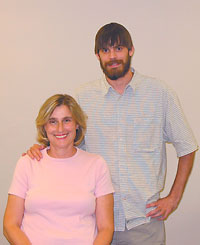Lamaze instructor donates kidney to son
By Phyllis Moore
Published in News on June 28, 2004 1:59 PM
Edie Brisson has coached expectant couples in the art of Lamaze for 25 years. She knows what it means to breathe new life into the world, and she knows the strong pull a parent feels to ensure the child's safety.
Now she has responded to that urge in a new way. Her 23-year-old son, David, needed a new kidney to replace a diseased one, and Mrs. Brisson donated one of hers.

News-Argus/Lisa Teachey
Edie and David Brisson
David Brisson was diagnosed with progressive kidney disease seven years ago while a sophomore at Wayne Country Day School. It was not hereditary and there was no family history of the disease.
"They think it was caused by a rare earth metal, like mercury," Brisson says now. "But they don't really know."
Mrs. Brisson called it an auto-immune disease that attached itself to her son's kidney. Except for feeling quite tired, she said, he fared pretty well under treatment until about a year ago.
In January, his kidney function was so low that he was placed on the national transplant list. It was also decided that the family be tested as possible donor matches.
A sibling match was initially sought, until the surgery was moved to Vanderbilt University Hospital in Tennessee.
"Doctors felt that he would need a minimum of two kidneys in his life, due to his age," Mrs. Brisson said. "So they went with the parent donor first and said they would go with a sibling if he later requires another one."
A total of nine family members, including David's four siblings, his parents, and cousins, were willing to be tested, Mrs. Brisson said.
As it turned out, she was the first one tested and was found to be a good match.
"I was identified as having three out of six issues that matched," she said. "So I was the only one that was worked up."
The family has made several trips to Tennessee since February. On May 25, Mrs. Brisson's left kidney was transplanted into her son's right side. His own were not removed, so he now has three.
The operation, she said, was a rapid success.
"It started working within minutes of the transplant," she said.
She was released from the hospital three days later, her son the day after that.
A week later, though, she developed complications and was re-admitted for another week.
The mother and son continue to be monitored by doctors. Brisson says he feels better since the operation and his appetite has improved. He takes anti-rejection drugs, which his mother says will be the case for the rest of his life.
"The drugs run $300 a day," she said. "They cost about $3,000 a month."
Not all of it is covered by insurance, which may be good incentive behind David's future career plans.
After finishing high school at McCallie Prep School in Chattanooga, Tenn., he continued his education at N.C. State University. Despite his health problems, he postponed surgery until he had completed the spring semester. He missed only the first session of summer school and plans to return for the second session, which starts this week. He is on track to graduate next spring with a degree in biomedical engineering.
Mrs. Brisson, who is 50, worked in the labor and delivery departments at Wayne Memorial Hospital until her son was diagnosed with the kidney disease in 1997. She has continued in her role as a self-employed Lamaze instructor at the hospital. She took off five weeks for the surgery.
She said she hopes to resume teaching expectant couples soon. She is still recuperating from the transplant operation and is dealing with some nerve damage to her leg.
"Focusing on the fact that it worked for him makes it all worthwhile for me," she says.
"I'd do it again."
